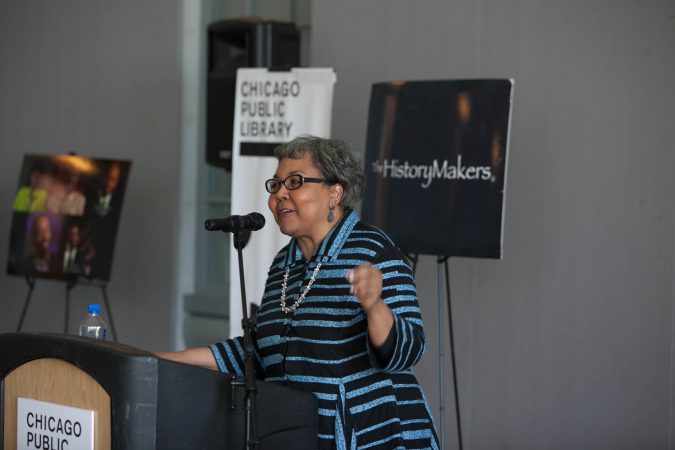
The HistoryMakers and Chicago Public Library Announce Free Access to Nation’s Largest African-American History Archive
Since 1999, The HistoryMakers have been recording African-American oral histories to refashion a more inclusive record of American history. The HistoryMakers are committed to preserving and making widely accessible the personal stories of African Americans — both well-known and unsung. Offering the most significant recording of past and present African-American influencers, The HistoryMakers are a vital online resource for the city’s students, educators and researchers.
Last week, Deputy Mayor Andrea Zopp joined Chicago Public Library (CPL) Commissioner Brian Bannon and The HistoryMakers Founder & Executive Director Julieanna Richardson to kick off the start of Black History Month and announce CPL’s offering of The HistoryMakers Digital Archive to the public — free of charge.
Chicago Public Library is the first public library to offer patrons unlimited access to the extensive HistoryMakers video database of interviews with more than 1,700 African-Americans. By the end of 2017, the collection is slated to house 2,700 interviews of primary source material. Full remote access to the entire HistoryMakers database through the CPL website (with a library card) is slated to start this spring.

“There isn’t a better way to kick off African-American History Month than providing Chicagoans access to the experiences of African-American heroes through The HistoryMakers digital archive,” said Deputy Mayor Zopp. “This is an innovative partnership that makes firsthand accounts and untold stories available to the public for the first time. I’m honored to be included in this historic archive alongside so many influencers and unsung heroes.”
“The hallmark of public libraries is the availability of resources to everyone. HistoryMakers is such a valuable resource, that in its entirety has only previously been available to students or researchers,” said Brian Bannon. “We are thrilled to make these digital archives available to the public so Chicagoans can use this rich resource through CPL.”
“I want to applaud Chicago Public Library Commissioner Brian Bannon, and the City of Chicago, for making this significant contribution to the citizens of Chicago,” said Richardson. “This is the same Digital Archive that has been licensed by 18 of the country’s top-tier universities — including the University of Chicago and Northwestern University.”

Living the Story
On hand at the special announcement was Dr. Timuel D. Black, who helped organize the historic March on Washington working alongside Dr. Martin Luther King Jr. He says, “The new generation may not know the history as well as they would like to know. An organization like the HistoryMakers gives them easy access to that information which helps them to tell the story, expand it, and give them validity. The people telling the story are people who live the story that they’re telling, and the HistoryMakers are the primary care source. Dr. Black says the information of our ancestors “would not be available just through the reading about it” if it wasn’t for the organization.
Carnegie Mellon University graduate Dionti Davis is the special assistant to the executive director, Julieanna Richardson at the HistoryMakers. At 26, this role is a dream come true, earning his B.A. in history and minoring in African-American studies.
He is happy that his alma mater is one of several collegiate institutions that have partnered with the organization to reach their students. Although the institution doesn’t have a traditional high African-American student enrollment, Davis feels it’s an important resource of knowledge. “I think for us, those universities are the ones we want to target because we feel that many institutions don’t know their Black alumnus, their current students are overlooked and they don’t get the resources or support that they might need,” said Davis.
As a millennial, and the youngest on staff, he understands there is sometimes a disconnect between his peer group and the elders, but believes HistoryMakers is a necessary way of bringing generations together to share and compare.
“You look at the things going on recently — Black Lives Matter and police brutality. There is a gap on how my generation approaches things and the way that past generations do. We need to bridge that gap and having something like the HM digital archives — seeing people talk about their experience during the Civil Rights movement or while they were growing up during segregation can bridge that gap and give younger people an opportunity to relate,” He explains. “They think, ‘wow, they went through something like me — it’s not just something that I’m reading in a book.’ They are actually reliving those experiences through facial expressions, hearing their emotions in their voice because it’s real.”



